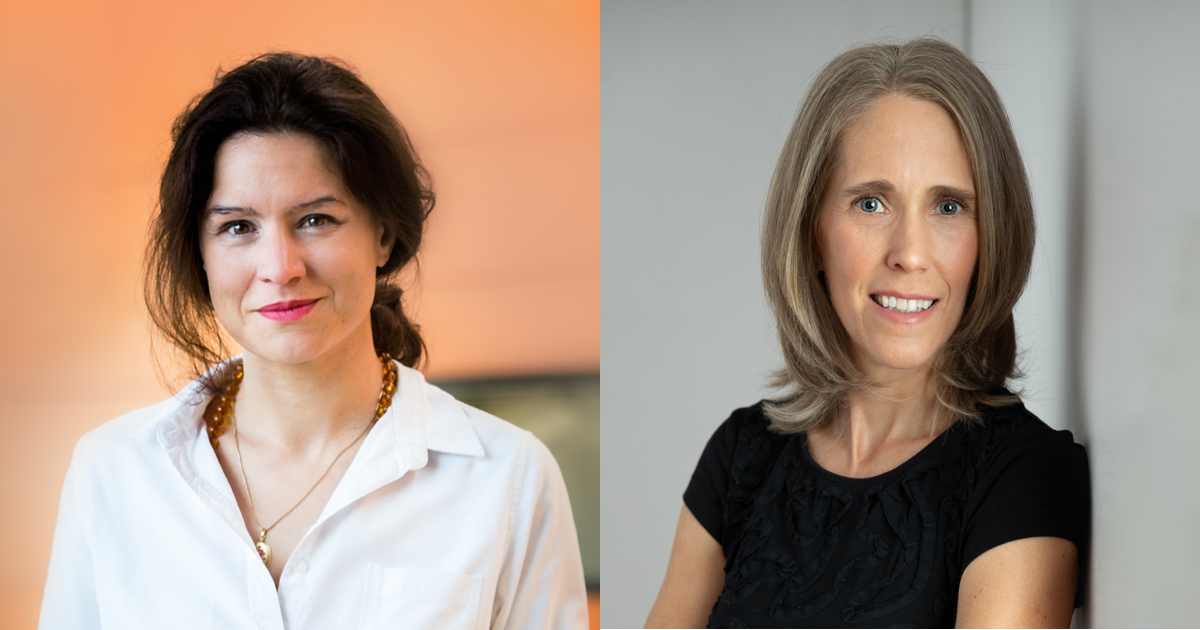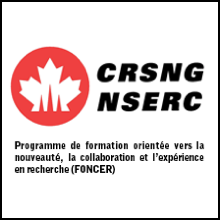Nouvelles
Two of Polytechnique’s professors receive $1.65 M in funding to support innovative mentorship program
Engineering Physics Professor Clara Santato and Mechancial Engineering Professor Isabelle Villemure (right-hand side in photo) eached received a $1.65 M grant from the Natural Sciences and Engineering Research Council of Canada’s (NSERC) Collaborative Research and Training Experience Program (CREATE).

From left to right: Professor Clara Santato, Department of Engineering Physics; Professor Isabelle Villemure, Department of Mechanical Engineering (photo: Gaëlle Vuillaume)..
A gold mine awaits in discarded electronic equipment
Professor Clara Santato has received funding from the federal government for the Collaborative Research and Training Experience in Sustainable Electronics and Eco-Design (CREATE SEED) initiative, where she is principal investigator. In this program, student interns and researchers will address issues related to electrical and electronic equipment waste (also known as WEEE or e-waste), by optimizing component recovery and recycling from existing waste.
Ever-growing demand for electronic products produces enormous amounts of waste; in 2016 alone, it amounted to 44.7 megatonnes, to which Canada contributed 724 kilotonnes. E-waste contains substances that are hazardous to both health and the environment - but also contains precious metals, of economic interest to the recycling industry. For example, there is 100 times more gold in a tonne of mobile phones, than in a tonne of gold ore – the material value of which alone is $62.5 billion.
To help solve the growing e-waste production problem, as well as the loss of precious metal resources, Professor Santato, together with her research partners, developed the CREATE SEED program. Professor Santato and her research partners believe that the adoption of sustainable-development principles in the electronics industry requires a paradigm shift from a linear to a circular economy.
The program has both training and research objectives. The first objective seeks to change conceptual thinking paradigms about electronics, break down information silos, and eliminate blind spots - particularly in the field of ecotoxicology, and in terms of raising awareness about the universal nature of the e-waste problem. The second objective is to rethink electronic product design, using the best of conventional inorganic electronics and emerging organic technologies, combined with the development of manufacturing processes that minimize e-waste’s environmental footprint.
Polytechnique Montréal’s Professors Sophie Bernard, Daria Camilla Boffito, Maleknaz Nayebi, Jamal Chaouki, Jinghui Cheng, Jean-Marc Frayret, Stéphane Kéna-Cohen, Manuele Margni, David Ménard, Yvon Savaria, and Alberto Teyssedou, as well as Postdoctoral Fellow Guillaume Majeau-Bettez, are participating in CREATE SEED efforts and activities.
Researchers from the Institut national de la recherche scientifique (Professor Federico Rosei, UNESCO Chair), McGill University (Professors Audrey Moore, Noémie Dorval-Courchesne and Saji George), University of Toronto (Professor Nazir Kherani), University of Waterloo (Professor Marcel O’Gorman) and University of British Columbia (Professor Maria Holuszko) are also part of the project. Other contributors involved with the CREATE SEED program include: the National Research Council of Canada, École de technologie supérieure (ÉTS), HEC Montréal, the Printability and Graphic Communications Institute, Université de Montréal, Université de Sherbrooke, New York City University’s Queen's College, Université du Nigéria - Nsukka and United Nations University.
Numerous partners are also implicated in the project, namely: the European Chemical Society, Bioastra Technologies, Celestica, MiQro Innovation Collaborative Centre (C2MI), Optel Group, Insertech, Intel, Medtronic, Sacré-Davey Engineering and Pyrocycle (the latter a start-up company established by Mohamed Khalil, PhD student in chemical engineering at Polytechnique Montréal). The CREATE SEED team would like to thank Sumitra Rajagopalan, Bioastra Founder and CEO, for her key role in numerous meetings and for her thought-provoking insights into industrial perspectives which have contributed greatly to defining the program.
Harnessing the creative potential of a multidisciplinary scientific team
CREATE supports Polytechnique’s training program Optimizing Power Skills in Interdisciplinary, Diverse and Innovative Academic Networks (also known as OPSIDIAN in French and English), also developed by Professor Villemure and her team. The latter program supports the acquisition of the cross-disciplinary skills required to evolve research and development ecosystems, where the process of knowledge and technology co-creation blends with industry, decision-makers’ and communities’ needs and realities.
OPSIDIAN offers a unique autonomous training model applicable to science, engineering, and beyond: it recognizes the strategic importance of skills that permit a harnessing of the full dynamic creative potential of diverse and interdisciplinary teams. This innovative approach to cross-disciplinary training is unique in Canada, and the first program of its kind in the history of the NSERC/CREATE grant program. OPSIDIAN meaningfully addresses scientific diversity (intersectorality) originating from various academic backgrounds, and identity diversity (intersectionality), both of which then combine to create and foster diverse perspectives that optimize creativity and innovation.
This six-year program is based on an experiential learning approach that fully engages students in the educational process. Interns will acquire theoretical knowledge and implement it via dynamic and interactive activities that optimize collaborative and creative interactions in interdisciplinary and diverse teams. Cross-disciplinary skills include communication, listening, leadership, conflict management, and teamwork organization. These transferable and evolving skills will provide interns with a decisive advantage, by enabling them to evolve in knowledge co-creation ecosystems that are the future, and the new reality of the R&D industry in Canada and around the world.
By taking a collaborative approach to intersectorality and intersectionality, OPSIDIAN endeavours to introduce its interns to the realities and benefits of the Canadian R&D environment. Naturally, researchers involved with the OPSIDIAN program work in diverse fields that reflect this reality, and come from engineering (biomedical, civil, industrial, computer science, and mechanics) but also such complementary disciplines such as education, circus arts, technological arts, management, kinesiology, linguistics, dentistry, music, speech-language pathology, audiology, rehabilitation, and sociology.
Upon graduation, OPSIDIAN interns will be ambassadors for the strategic importance of diversity and interdisciplinarity in knowledge co-creation ecosystems. In the long term, OPSIDIAN’s ambition is to transfer its training model to other Canadian universities from coast to coast.
Professors Catherine Beaudry, Farida Cheriet, Sarah Dorner and Annie Ross, from Polytechnique Montréal, as well as Nandita Basu (Uniververisty of Waterloo), Marilou Bélisle (Université de Sherbrooke), Patrick Cohendet (HÉC Montréal), Ève Langelier (Université de Sherbrooke), Catherine Laporte (ÉTS) and Larry Lessard (McGill University) will also be a part of the training program led by Professor Villemure. Several key collaborateurs will also play a pivotal role in this training program: from Polytechnique Judith Cantin and Renée-Pascale Laberge, and sociologists Sirma Bilge (Montréal) and Louise Vandelac (UQAM).
Warm congratulations go out to Professors Santato and Villemure!
Learn more
Professor Clara Santato expertise
Professor Isabelle Villemure expertise
OPSIDIAN program website (In French)
Department of Engineering Physics website
Department of Mechanical Engineering website
CREATE-SEED program website
Natural Sciences and Engineering Research Council of Canada (NSERC) website




